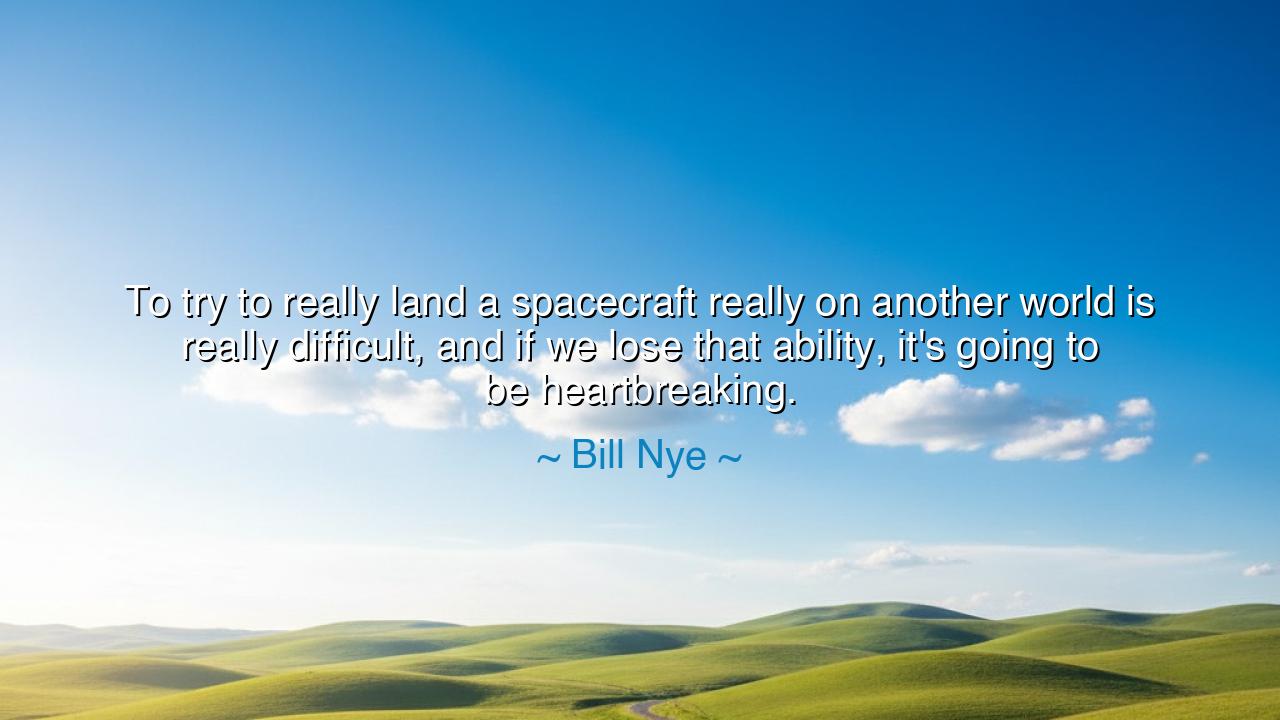
To try to really land a spacecraft really on another world is
To try to really land a spacecraft really on another world is really difficult, and if we lose that ability, it's going to be heartbreaking.






Children, gather close and hear the words of Bill Nye, a modern philosopher of science and discovery, who once said, "To try to really land a spacecraft really on another world is really difficult, and if we lose that ability, it's going to be heartbreaking." These words carry the weight of human ambition, the very essence of the dreams that fuel our exploration of the unknown. To land a spacecraft on another world—be it Mars, the Moon, or some distant planet—requires more than just technology. It requires vision, courage, and an unyielding commitment to reach beyond what we know, to strive for something that, at one time, seemed impossible. And yet, this dream is what drives humanity forward.
Think, children, of the ancient explorers, who sailed across vast oceans, driven by a longing to discover new lands, to chart the unknown. Christopher Columbus set sail toward the horizon, knowing not what lay beyond, but with a vision that was stronger than any fear. Marco Polo ventured into the heart of Asia, across deserts and mountains, not knowing what dangers awaited him but driven by the hope of discovery. These men did not have the technology we have today, but their hearts were filled with the same desire to reach beyond the known world, to touch what had once been just a dream.
And now, in our time, we too stand on the edge of something extraordinary. The ability to land a spacecraft on another world is not just a technological feat; it is the culmination of centuries of human dreams—dreams that were passed down from the explorers of the past, who dared to look beyond their world and see new possibilities. We have reached a time when, for the first time in history, humanity has the tools to touch the heavens in a way that was once reserved for gods and myth. To lose that ability, as Bill Nye so poignantly expresses, would be to lose not just a technological achievement, but the heart of human progress, the very essence of our will to explore, to discover, and to grow.
Let us also recall the story of NASA’s Apollo 11 mission. In 1969, Neil Armstrong and Buzz Aldrin became the first humans to set foot on the surface of the Moon, an achievement that was beyond the wildest dreams of those who had come before them. The technology to reach the Moon had been developed over decades, through trials and failures, through the sweat and blood of men and women dedicated to a vision. When Armstrong took his famous step, “one small step for man, one giant leap for mankind,” he was not just speaking for himself, but for every soul that had ever looked up at the stars and dreamed of touching them. The heartbreak of losing the ability to land on other worlds would be the loss of that same dream, that same vision that has propelled humanity to achieve the extraordinary.
But Nye’s words remind us that achieving greatness is never without its challenges. The task of landing a spacecraft on another world is a monumental one, fraught with complexity and risk. To fail in this endeavor is to face the crushing weight of defeat, but it is also an opportunity for growth. Every failure in the journey of space exploration has been a lesson, a stepping stone that has brought humanity closer to its ultimate goal. Yet, if we lose that ability, as Nye warns, we risk losing the drive to continue, the belief that we can overcome challenges and reach beyond the stars.
And so, the lesson is clear, children: never give up on your dreams, no matter how difficult or impossible they may seem. Just as NASA persevered through the hardships of space exploration, so too must you persist in the pursuit of your own goals. Humanity has always been driven by the desire to reach further, to achieve more, to touch the untouchable. It is this spirit of exploration that has led us to the Moon, and it will carry us to distant planets and beyond. Do not be discouraged by the obstacles before you. Remember that each challenge is an opportunity for growth, and that through perseverance, you too can achieve the seemingly impossible.
So, children, as you walk through life, remember that dreams are not just fleeting thoughts—they are the fuel that drives us toward greatness. Keep your eyes on the stars, and let them inspire you to reach beyond the limits of what is known. Just as we, as a people, strive to land on new worlds, so too should you strive to land in new realms of understanding, wisdom, and achievement. Let the heart of exploration guide you, and know that no matter how difficult the journey, the reward lies in the pursuit of something greater than ourselves. The stars are within your reach, if only you have the courage to reach for them.






AAdministratorAdministrator
Welcome, honored guests. Please leave a comment, we will respond soon